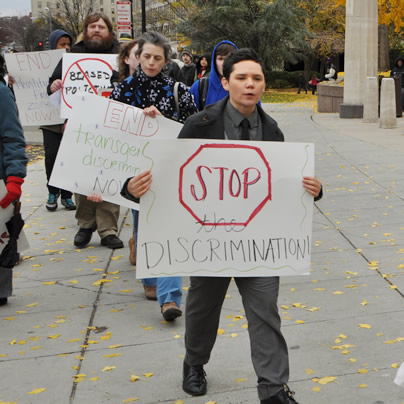National
Oregon bans anti-trans health care discrimination
Basic Rights Oregon worked with state officials to clarify a 2007 anti-discrimination law


Mara Keisling, executive director of the National Center for Transgender Equality (Washington Blade file photo by Michael Key)
Transgender advocates have applauded new regulations that ban private health insurance companies in Oregon from discriminating against trans policy holders.
The guidelines the Oregon Insurance Division of the state Department of Consumer and Business Services announced on Dec. 19 specifically prohibit health care providers from discriminating against a policy holder based on their actual or perceived gender identity and expression. Under the guidelines, providers cannot deny coverage of hormone therapy, hysterectomies, mastectomies and other medically-necessary treatments for gender dysphoria and sex-reassignment surgery that are covered for non-trans policy holders.
The agency also prohibited insurance companies from denying coverage of a particular treatment simply because the policy holder is trans. The guidelines also expand Oregon’s statewide mandate for mental health services to include trans Oregonians.
Basic Rights Oregon, a statewide LGBT advocacy group, had been working with the agency to expand these protections to trans policy holders since 2009.
Lawmakers in 2007 approved a law that explicitly banned discrimination based on sexual orientation — they defined it to include gender identity and expression, but Basic Rights Oregon had sought clarification from the agency after it received complaints from trans policy holders.
“What this means is that trans Oregonians will have access to basic medically necessary care,” Tash Shatz, trans justice program manager at Basic Rights Oregon, told the Washington Blade on Monday. “It’s a huge victory for the transgender community in Oregon. It really represents a sea change in terms of this issue.”
Michael Silverman, executive director of the Transgender Legal Defense and Education Fund, agreed.
“Oregon has correctly recognized that the well-established medical consensus is that transgender-related health care is medically necessary care,” he said. “This care is designed to treat a recognized medical condition. Transgender individuals pay the same premiums as everyone else and simply want the same benefits.”
The agency released its new guidelines two days after Oregon Health and Science University announced it would cover trans-specific health care. Intel, which is headquartered in Hillsboro, Ore., is among the 25 percent of Fortune 100 companies that currently offer trans-inclusive health care policies to their employees.
The cities of Portland, Seattle and San Francisco and Multnomah County, Ore., also cover trans-specific treatments in their health care plans. The California Department of Insurance has also enacted regulations similar to those in Oregon.
The American Psychiatric Association, the American Psychological Association and the Internal Revenue Service have said trans-specific treatments are medically-necessary care. The American Psychiatric Association on Dec. 2 announced it would remove Gender Identity Disorder from its list of mental disorders and replace it with Gender Dysphoria.
National Center for Transgender Equality Executive Director Mara Keisling told the Blade that colleges and universities, professional agencies and labor unions are among those that continue to advance efforts to ensure health insurance providers cover trans-specific treatments and procedures. She noted the SEIU, which covers full transitionary care for its staff, passed a resolution in May that asked local affiliates to advocate for these benefits in contract negotiations.
“There’s a lot of really, really great advocacy going on in this area right now,” Keisling said. “[What’s] really going on here is just updating these policies now that we have better understanding of medical science, of who trans people are, now we have lots of trans people in the workplace, so we’re going to see more and more of this. This will not be the last state to do that.”
The White House
Expanded global gag rule to ban US foreign aid to groups that promote ‘gender ideology’
Activists, officials say new regulation will limit access to gender-affirming care

The Trump-Vance administration has announced it will expand the global gag rule to ban U.S. foreign aid for groups that promote “gender ideology.”
Deputy Secretary of State Christopher Landau in a memo, titled Combating Gender Ideology in Foreign Assistance, the Federal Register published on Jan. 27 notes “previous administrations … used” U.S. foreign assistance “to fund the denial of the biological reality of sex, promoting a radical ideology that permits men to self-identify as women, indoctrinate children with radical gender ideology, and allow men to gain access to intimate single-sex spaces and activities designed for women.”
“Efforts to eradicate the biological reality of sex fundamentally attack women by depriving them of their dignity, safety, and well-being. It also threatens the wellbeing of children by encouraging them to undergo life-altering surgical and chemical interventions that carry serious risks of lifelong harms like infertility,” reads the memo. “The erasure of sex in language and policy has a corrosive impact not just on women and children but, as an attack on truth and human nature, it harms every nation. It is the purpose of this rule to prohibit the use of foreign assistance to support radical gender ideology, including by ending support for international organizations and multilateral organizations that pressure nations to embrace radical gender ideology, or otherwise promote gender ideology.”
President Donald Trump on Jan. 28, 2025, issued an executive order — Protecting Children from Chemical and Surgical Mutilation — that banned federal funding for gender-affirming care for minors.
President Ronald Reagan in 1985 implemented the global gag rule, also known as the “Mexico City” policy, which bans U.S. foreign aid for groups that support abortion and/or offer abortion-related services.
Trump reinstated the rule during his first administration. The White House this week expanded the ban to include groups that support gender-affirming care and diversity, equity, and inclusion programs.
The expanded global gag rule will take effect on Feb. 26.
“None of the funds made available by this act or any other Act may be made available in contravention of Executive Order 14187, relating to Protecting Children From Chemical and Surgical Mutilation, or shall be used or transferred to another federal agency, board, or commission to fund any domestic or international non-governmental organization or any other program, organization, or association coordinated or operated by such non-governmental organization that either offers counseling regarding sex change surgeries, promotes sex change surgeries for any reason as an option, conducts or subsidizes sex change surgeries, promotes the use of medications or other substances to halt the onset of puberty or sexual development of minors, or otherwise promotes transgenderism,” wrote Landau in his memo.
Landau wrote the State Department “does not believe taxpayer dollars should support sex-rejecting procedures, directly or indirectly for individuals of any age.”
“A person’s body (including its organs, organ systems, and processes natural to human development like puberty) are either healthy or unhealthy based on whether they are operating according to their biological functions,” reads his memo. “Organs or organ systems do not become unhealthy simply because the individual may experience psychological distress relating to his or her sexed body. For this reason, removing a patient’s breasts as a treatment for breast cancer is fundamentally different from performing the same procedure solely to alleviate mental distress arising from gender dysphoria. The former procedure aims to restore bodily health and to remove cancerous tissue. In contrast, removing healthy breasts or interrupting normally occurring puberty to ‘affirm’ one’s ‘gender identity’ involves the intentional destruction of healthy biological functions.”
Landau added there “is also lack of clarity about what sex-rejecting procedures’ fundamental aims are, unlike the broad consensus about the purpose of medical treatments for conditions like appendicitis, diabetes, or severe depression.”
“These procedures lack strong evidentiary foundations, and our understanding of long-term health impacts is limited and needs to be better understood,” he wrote. “Imposing restrictions, as this rule proposes, on sex-rejecting procedures for individuals of any age is necessary for the (State) Department to protect taxpayer dollars from abuse in support of radical ideological aims.”
Landau added the State Department “has determined that applying this rule to non-military foreign assistance broadly is necessary to ensure that its foreign assistance programs do not support foreign NGOs and IOs (international organizations) that promote gender ideology, and U.S. NGOs that provide sex-rejecting procedures, and to ensure the integrity of programs such as humanitarian assistance, gender-related programs, and more, do not promote gender ideology.”
“This rule will also allow for more foreign assistance funds to support organizations that promote biological truth in their foreign assistance programs and help the (State) Department to establish new partnerships,” he wrote.
The full memo can be found here.
Council for Global Equality Senior Policy Fellow Beirne Roose-Snyder on Wednesday said the expansion of the so-called global gag rule will “absolutely impact HIV services where we know we need to target services, to that there are non-stigmatizing, safe spaces for people to talk through all of their medical needs, and being trans is really important to be able to disclose to your health care provider so that you can get ARVs, so you can get PrEP in the right ways.” Roose-Snyder added the expanded ban will also impact access to gender-affirming health care, food assistance programs and humanitarian aid around the world.
“This rule is not about gender-affirming care at all,” she said during a virtual press conference the Universal Access Project organized.
“It is about really saying that if you want to take U.S. funds — and it’s certainly not about gender-affirming care for children — it is if you want to take U.S. funds, you cannot have programs or materials or offer counseling or referrals to people who may be struggling with their gender identity,” added Roose-Snyder. “You cannot advocate to maintain your country’s own nondiscrimination laws around gender identity. It is the first place that we’ve ever seen the U.S. government define gender-affirming care, except they call it something a lot different than that.”
The Congressional Equality Caucus, the Democratic Women’s Caucus, the Congressional Hispanic Caucus, the Congressional Asian and Pacific American Caucus, and the Congressional Black Caucus also condemned the global gag rule’s expansion.
“We strongly condemn this weaponization of U.S. foreign assistance to undermine human rights and global health,” said the caucuses in a statement. “We will not rest until we ensure that our foreign aid dollars can never be used as a weapon against women, people of color, or LGBTQI+ people ever again.”

Advocacy groups are demanding the Trump-Vance administration not to deport two gay men to Iran.
MS Now on Jan. 23 reported the two men are among the 40 Iranian nationals who the White House plans to deport.
Iran is among the countries in which consensual same-sex sexual relations remain punishable by death.
The Washington Blade earlier this month reported LGBTQ Iranians have joined anti-government protests that broke out across the country on Dec. 28. Human rights groups say the Iranian government has killed thousands of people since the demonstrations began.
Rebekah Wolf of the American Immigration Council, which represents the two men, told MS Now her clients were scheduled to be on a deportation flight on Jan. 25. A Human Rights Campaign spokesperson on Tuesday told the Blade that one of the men “was able to obtain a temporary stay of removal from the” 10th U.S. Circuit Court of Appeals, and the other “is facing delayed deportation as the result of a measles outbreak at the facility where they’re being held.”
“My (organization, the American Immigration Council) represents those two gay men,” said American Immigration Council Senior Fellow Aaron Reichlin-Melnick in a Jan. 23 post on his Bluesky account. “They had been arrested on charges of sodomy by Iranian moral police, and fled the country seeking asylum. They face the death penalty if returned, yet the Trump (administration) denied their asylum claims in a kangaroo court process.”
“They are terrified,” added Reichlin-Melnick.
My org @immcouncil.org represents those two gay men. They had been arrested on charges of sodomy by Iranian moral police, and fled the country seeking asylum. They face the death penalty if returned, yet the Trump admin denied their asylum claims in a kangaroo court process.
They are terrified.
— Aaron Reichlin-Melnick (@reichlinmelnick.bsky.social) January 23, 2026 at 8:26 AM
Reichlin-Melnick in a second Bluesky post said “deporting people to Iran right now, as body bags line the street, is an immoral, inhumane, and unjust act.”
“That ICE is still considering carrying out the flight this weekend is a sign of an agency and an administration totally divorced from basic human rights,” he added.
Deporting people to Iran right now, as body bags line the street, is an immoral, inhumane, and unjust act. That ICE is still considering carrying out the flight this weekend is a sign of an agency and an administration totally divorced from basic human rights. www.ms.now/news/trump-d…
— Aaron Reichlin-Melnick (@reichlinmelnick.bsky.social) January 23, 2026 at 8:27 AM
HRC Vice President of Government Affairs David Stacy in a statement to the Blade noted Iran “is one of 12 nations that still execute queer people, and we continue to fear for their safety.” Stacy also referenced Renee Good, a 37-year-old lesbian woman who a U.S. Immigration and Customs Enforcement agent shot and killed in Minneapolis on Jan. 7, and Andry Hernández Romero, a gay Venezuelan asylum seeker who the Trump-Vance administration “forcibly disappeared” to El Salvador last year.
“This out-of-control administration continues to target immigrants and terrorize our communities,” said Stacy. “That same cruelty murdered Renee Nicole Good and imprisoned Andry Hernández Romero. We stand with the American Immigration Council and demand that these men receive the due process they deserve. Congress must refuse to fund this outrage and stand against the administration’s shameless dismissal of our constitutional rights.”
Federal Government
Top Democrats reintroduce bill to investigate discrimination against LGBTQ military members
Takano, Jacobs, and Blumenthal sponsored measure

Multiple high-ranking members of Congress reintroduced the Commission on Equity and Reconciliation in the Uniformed Services Act into the U.S. House of Representatives and the U.S. Senate, aiming to establish a commission to investigate discriminatory policies targeting LGBTQ military members.
Three leading Democratic members of Congress — U.S. Rep. Mark Takano (D-Calif.), who is the House Veterans’ Affairs Committee’s ranking member and chairs the Congressional Equality Caucus; U.S. Sen. Richard Blumenthal (D-Conn.), who is the Senate Veterans’ Affairs Committee’s ranking member; and U.S. Rep. Sara Jacobs (D-Calif.) — introduced the bill on Tuesday.
The bill, they say, would establish a commission to investigate the historic and ongoing impacts of discriminatory military policies on LGBTQ servicemembers and veterans.
This comes on the one-year anniversary of the Trump-Vance administration’s 2025 Executive Order 14183, titled “Prioritizing Military Excellence and Readiness,” which essentially banned transgender servicemembers from openly serving in the Armed Forces, leading to the forced separation of thousands of capable and dedicated servicemembers.
In a joint statement, Takano, Blumenthal, and Jacobs shared statistics on how many service members have had their ability to serve revoked due to their sexual orientation:
“Approximately 114,000 servicemembers were discharged on the basis of their sexual orientation between WWII and 2011, while an estimated 870,000 LGBTQ servicemembers have been impacted by hostility, harassment, assault, and law enforcement targeting due to the military policies in place,” the press release reads. “These separations are devastating and have long-reaching impacts. Veterans who were discharged on discriminatory grounds are unable to access their benefits, and under the Trump administration, LGBTQ+ veterans and servicemembers have been openly persecuted.”
The proposed commission is modeled after the Congressional commission that investigated and secured redress for Japanese Americans interned during World War II. Takano’s family was among the more than 82,000 Japanese Americans who received an official apology and redress payment under that commission.
The press release notes this is a major inspiration for the act.
“Qualified servicemembers were hunted down and forced to leave the military at the direction of our government,” said Takano. “These practices have continued, now with our government targeting transgender servicemembers. The forced separation and dishonorable discharges LGBTQ+ people received must be rectified, benefits fully granted, and dignity restored to those who have protected our freedoms.”
“LGBTQ+ servicemembers have long been the target of dangerous and discriminatory policies—resulting in harassment, involuntary discharge, and barriers to their earned benefits,” said Blumenthal. “Establishing this commission is an important step to understand the full scope of harm and address the damage caused by policies like ‘Don’t Ask, Don’t Tell.’ As LGBTQ+ servicemembers and veterans face repugnant and blatant bigotry under the Trump administration, we will keep fighting to secure a more equitable future for all who serve our country in uniform.”
“Instead of righting wrongs and making amends to our LGBTQ+ service members and veterans who’ve suffered injustices for decades, I’m ashamed that the Trump administration has doubled down: kicking trans folks out of the military and banning their enlistment,” said Jacobs. “We know that LGBTQ+ service members and veterans have faced so much ugliness — discrimination, harassment, professional setbacks, and even violence — that has led to unjust discharges and disparities in benefits, but we still don’t have a full picture of all the harm caused. That needs to change. That’s why I’m proud to co-lead this bill to investigate these harms, address the impacts of discriminatory official policies like ‘Don’t Ask, Don’t Tell’ and the transgender military ban, and ensure equity and justice for our LGBTQ+ service members and veterans.”
Takano and Jacobs are leading the bill in the House, while Blumenthal is introducing companion legislation in the Senate.
Takano’s office has profiled and interviewed LGBTQ servicemembers who were harmed by discriminatory policies in the uniformed services.
The Commission on Equity and Reconciliation in the Uniformed Services Act is supported by Minority Veterans of America, Human Rights Campaign, Equality California, SPARTA, and the Transgender American Veterans Association.
In recent weeks, thousands of trans military members were forcibly put into retirement as a result of Trump’s executive order, including five honored by the Human Rights Campaign with a combined 100 years of service, all due to their gender identity: Col. Bree B. Fram (U.S. Space Force), Commander Blake Dremann (U.S. Navy), Lt. Col. (Ret.) Erin Krizek (U.S. Air Force), Chief Petty Officer (Ret.) Jaida McGuire (U.S. Coast Guard), and Sgt. First Class (Ret.) Catherine Schmid (U.S. Army).
Multiple career service members spoke at the ceremony, including Takano. Among the speakers was Frank Kendall III, the 26th U.S. Air Force secretary, who said:
“We are in a moment of crisis that will be worse before it is better. Members of my father’s and mother’s generation would ask each other a question: what did you do during the war? Someday we will all be asked what we did during this time. Please think about the answer that you will give.”
-

 Real Estate4 days ago
Real Estate4 days agoConvert rent check into an automatic investment, Marjorie!
-

 Theater4 days ago
Theater4 days agoSwing actor Thomas Netter covers five principal parts in ‘Clue’
-

 District of Columbia4 days ago
District of Columbia4 days agoEleanor Holmes Norton ends 2026 reelection campaign
-

 Honduras3 days ago
Honduras3 days agoCorte IDH reconoce a Thalía Rodríguez como familia social de Leonela Zelaya




















